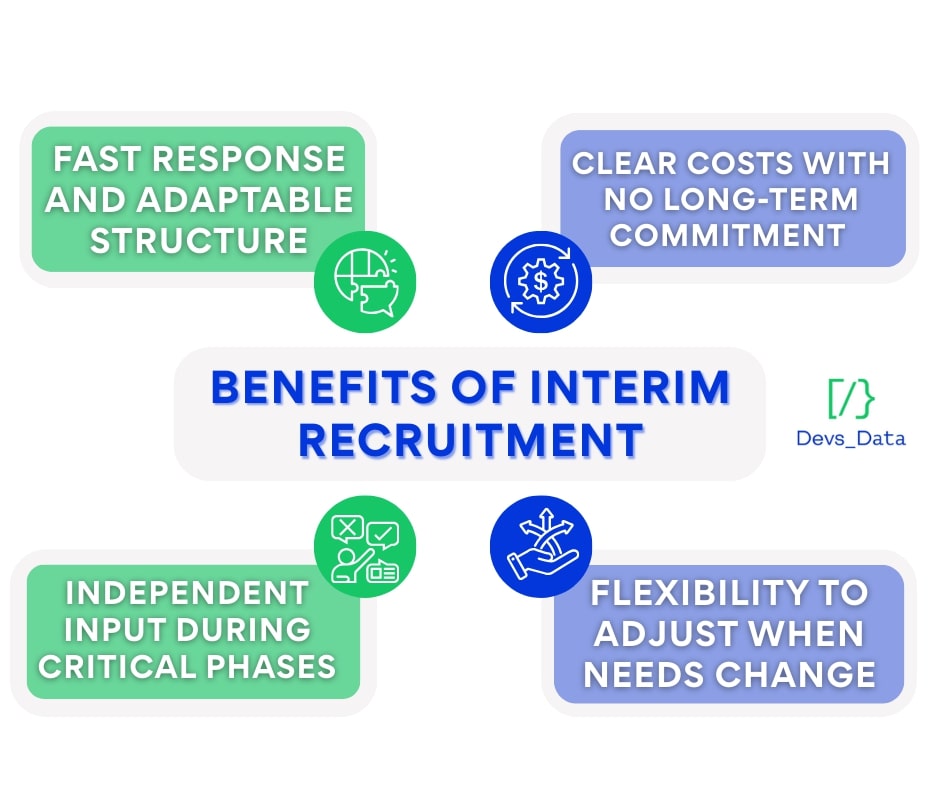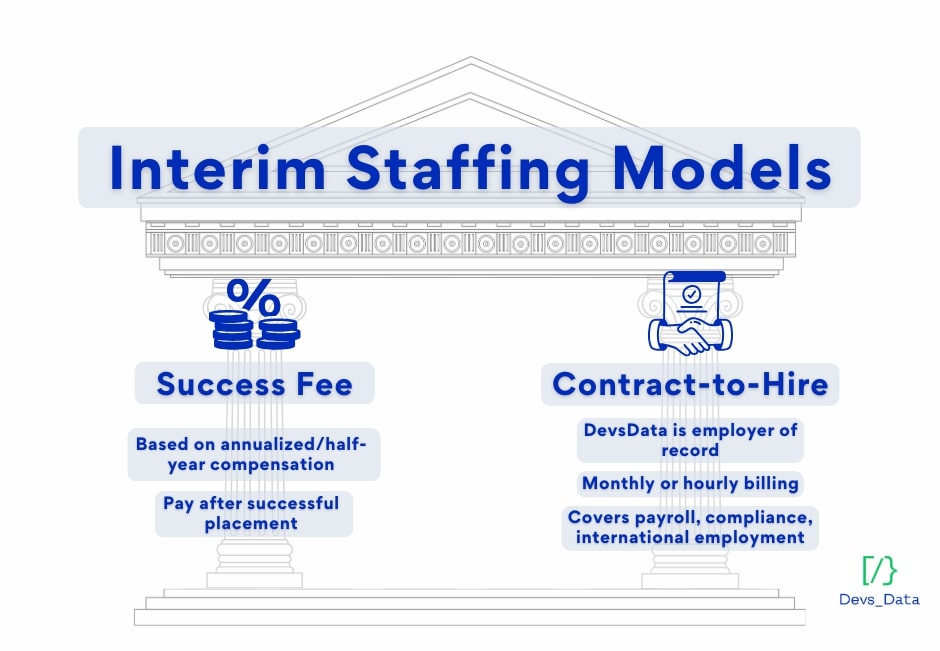


Leadership gaps, periods when an organization temporarily lacks the right executive oversight, rarely arrive with warning. They may arise from the sudden departure of a CEO or senior manager, an unexpected leave of absence, or even a major strategic shift that requires skills the current leadership team does not fully cover. In these moments, companies can find themselves without the direction or capacity needed to maintain momentum at a critical time.
Interim recruitment provides a practical solution, giving organizations rapid access to experienced executives who can stabilize operations, lead projects, and deliver results without long-term commitments. This isn’t a niche practice, as data shows that reliance on interim talent has been steadily increasing.
Forbes reported that the utilization rate (the percentage of available interim managers who are actively engaged in assignments) in Europe remained steady at 69% throughout 2023 and into 2024.
A 2025 update from DDIM found that the majority of interim professionals were actively on assignment, while most of the remaining group were either looking for new roles or between contracts. This reflects sectoral shifts and normal market movement rather than a downturn.
Interim executives bring experience, focus, and accountability to situations where results are needed without delay. Whether guiding a department through change or supporting a time-sensitive initiative, the right interim leader can have a profound and immediate impact.
This article takes a closer look at how interim recruitment works, the situations where it offers the most value, and why more organizations are turning to short-term leadership as a practical solution in uncertain times.
Interim recruitment involves bringing in seasoned professionals on a short-term basis. These assignments typically last from 2 to 12 months and focus on addressing specific leadership needs, managing transitions, or resolving critical challenges. For example, a company may bring in an interim CFO during a funding round, or appoint a temporary CTO to guide a product pivot. In some cases, interim managers are also placed at the department level, such as a Head of Marketing or Engineering, to lead during a period of change.
Unlike external consultants, interim executives take on active roles within the organization. They work alongside internal teams, accept responsibility for outcomes, and remain involved throughout execution.
In many cases, they also take on a developmental role by training, mentoring, or shadowing the future permanent hire, such as the next CFO, CTO, or departmental manager, so the transition is smoother and more sustainable.
This approach is especially effective when companies require fast decisions, clear direction, or specialized expertise without committing to a long-term hire.
Organizations turn to interim leaders for a variety of reasons. Common scenarios include:
Interim professionals often have experience across different industries and can adapt to new environments with ease. Their outside perspective helps organizations reassess priorities and take action without delay.
Interim executives are brought in to address a range of senior-level needs across departments. These professionals typically have deep subject matter expertise and a proven ability to lead during times of change. While roles vary by industry and situation, the table below highlights some of the most common interim positions and the typical challenges they are hired to address.
| Role | Typical Use Case |
|---|---|
| Interim CEO | Leads during leadership changes, restructures, or periods of uncertainty |
| Interim CFO | Manages funding rounds, cash flow issues, audits, or financial turnaround |
| Interim COO | Optimizes operations, improves workflows, or supports organizational scaling |
| Interim CTO | Sets technology strategy, leads architecture decisions, or oversees tech buildouts |
| Interim HR Director | Handles restructuring, talent strategy, or crisis-related people management |
| Interim Compliance Officer | Supports regulatory readiness, risk mitigation, or post-acquisition compliance |
| Interim Transformation Lead | Delivers high-priority programs like ERP rollout, market entry, or reorganization |
| Interim Product or Marketing Lead | Shapes go-to-market strategy, product roadmap, or branding shifts |
These positions show that interim leaders are most often brought in at critical junctures, such as financial restructuring, regulatory compliance, technology pivots, or market expansion, where delays or missteps could have lasting consequences. The unifying theme is that companies rely on interim executives not only to stabilize operations but also to deliver measurable progress within a limited timeframe.
The examples above show how interim executives step in across different functions during pivotal moments. Below, we discuss the key benefits organizations gain from these short-term leadership placements. Hiring interim professionals offers more than a quick fix. It provides a strategic path to navigate transitions, stabilize operations, and respond to urgent business needs with clarity and control.
Interim professionals are typically available within days or weeks, allowing companies to maintain momentum during critical periods. Their roles can be shaped around the business need, whether full-time for urgent transformation or part-time for advisory input. This flexibility makes it possible to scale leadership support without delay.
Unlike permanent hires, interim roles are limited in duration and come with clearly defined terms. Companies agree upfront on the scope, rate, and timeline, which helps control costs. Compared to advisory firms or long recruitment cycles, this model offers a more predictable and often more cost-effective solution for accessing senior expertise.
Interim leaders bring an outside perspective shaped by varied industry experience. They are not influenced by internal politics or legacy structures, which allows them to assess situations objectively and act with focus. This is especially valuable during restructuring, cultural change, or performance recovery efforts.
Because interim engagements are not tied to long-term contracts, they can be adapted as priorities evolve. Companies can extend the assignment, shift the scope, or phase the role out once the immediate goal is met. This level of control helps reduce risk and ensures leadership remains aligned with changing business conditions.

Interim recruitment can be highly effective, but it also comes with certain limitations. Being aware of these challenges helps companies decide when this approach is the right fit.
Even experienced professionals need time to understand the company’s structure, team dynamics, and internal processes. In fast-moving situations, this initial ramp-up can feel slower than expected, especially if internal documentation or support is limited.
Because interim roles are time-bound, they may not suit projects that require long-term oversight or continuity beyond the assignment. If not followed by a stable handover or permanent hire, progress made during the interim period can lose momentum.
Interim leaders are typically compensated at a higher rate due to their availability and experience. While the cost is often justified by the speed and impact they bring, it can be a challenge for companies with tighter financial constraints.
Despite these challenges, interim recruitment remains more than a stopgap measure. It gives organizations access to senior expertise exactly when it is most needed, whether to stabilize during a crisis, accelerate growth, or prepare for long-term leadership transitions. By combining speed, flexibility, and independence, short-term leadership placements help companies safeguard continuity while keeping options open for the future.

Interim recruitment is not a substitute for permanent hiring; it serves a different purpose. Companies may also consider fractional executives, who provide executive expertise on a part-time basis rather than stepping in full-time. The decision to bring in temporary or fractional leadership often depends on urgency, scope, and the level of commitment a company requires.
For instance, a business may need a senior operations leader to bring stability to a department that is underperforming. Instead of waiting months to complete a permanent search, an interim executive can step in immediately, steady the situation, and create a clearer picture of what a long-term hire should look like. Similarly, when testing a new position, such as a Chief Product Officer, an interim professional can define responsibilities, set initial goals, and help the company assess whether the role is needed on a permanent basis.
Fractional executives are best suited for situations where guidance is required only a few days each week. This model is especially useful for startups and fast-scaling companies. Examples include a fractional CFO shaping funding strategy, a part-time CTO defining product architecture, or a senior HR advisor guiding recruitment and policy development. These arrangements provide access to executive knowledge while keeping long-term commitments flexible.
For both interim and fractional placements, working with a recruitment partner that understands the market is critical. At DevsData LLC, industry experience ensures a focused search, closer candidate fit, and shorter hiring timelines, helping companies reduce delays and secure the leadership capacity they need.
Executive search and interim staffing are two distinct approaches to filling leadership roles. One is built for long-term strategy, the other for immediate impact. While both involve senior-level professionals, their goals and processes are entirely different. Let’s take a look at the table below.
| Aspect | Executive Search | Interim Staffing |
|---|---|---|
| Primary goal | Long-term leadership aligned with the company’s strategy | Immediate impact on a defined challenge or vacancy |
| Time horizon | Multi-year contribution, expected to grow with the organization | Short-term, typically months rather than years |
| Process | Structured and detailed; multiple evaluation stages; heavy focus on cultural fit | Fast selection based on availability, proven track record, and readiness to start quickly |
| Onboarding timeline | Several months, including reference checks, interviews, and negotiations | Days or weeks, with minimal ramp-up |
| Best use cases | Strategic growth, succession planning, and building sustainable leadership teams | Business recovery, project execution, crisis management, or bridging gaps during a search |
| Integration | Deep integration into the company culture and long-term plans | Focused delivery of outcomes without expectation of long-term retention |
| Combined approach | May be combined with interim staffing: interim leader provides support while the executive search process is underway | Often paired with executive search to avoid leadership gaps |
In some cases, companies use both and engage an interim leader to provide immediate support while searching for a permanent hire in parallel.
Executive search builds continuity, while interim staffing delivers focus and speed.
Another common comparison is between interim executives and consulting firms. While both offer external expertise, they serve very different functions:
| Interim Executive | Consulting Firm |
|---|---|
| Works on-site or as part of your internal team | Operates externally, offering advice and analysis |
| Accountable for execution and results | Provides recommendations, often leaves implementation to the client |
| Hired for a fixed term with clear objectives | Often open-ended and billed per project or hourly |
| Lower cost for leadership needs | Higher cost, especially for long-term transformation |
For companies that already have a capable internal team but lack specific leadership or execution experience, interim hiring is often the more efficient, affordable choice. That said, the two models can also work together. A consulting firm might design a strategy or transformation roadmap, while an interim executive is brought in to lead day-to-day execution and ensure the plan is delivered. This combination allows organizations to benefit from high-level analysis and actionable, accountable leadership at the same time.
Partnering with a recruitment agency brings efficiency and access to talent that companies may not reach on their own.
Agencies maintain extensive networks of proven executives who are ready to step in, saving companies the time and risk of searching from scratch. This reduces the chances of mismatched hires and ensures that candidates already have a record of success in similar assignments. For urgent leadership needs, this kind of ready access can make the difference between stalled progress and immediate momentum.
An agency can identify and present qualified candidates within days, ensuring leadership gaps do not slow down critical business operations. Their streamlined processes and dedicated focus allow them to move faster than internal HR teams managing multiple priorities. By minimizing downtime, companies protect performance during times of transition.
Recruiters assess both technical expertise and situational fit, aligning interim leaders with the specific challenges at hand. This objective perspective helps avoid internal bias and ensures that the chosen professional is not only skilled but also effective in the unique environment of the company. The result is a closer alignment between business needs and leadership capability.
Partnering with an agency allows leadership teams to focus on strategy while the agency handles sourcing, screening, and coordination. This is especially valuable in fast-paced situations where time and attention are already stretched. By outsourcing the administrative load, companies free internal teams to concentrate on immediate priorities.
These benefits make it clear why many organizations rely on agencies for interim recruitment. The next step is knowing how to identify the right partner, since the agency you select will directly shape the quality and impact of the placement.
Do you have IT recruitment needs?
While these benefits show why agencies add value, not all providers deliver the same quality. That makes choosing the right partner essential. A strong partner does more than fill a gap quickly; they provide access to trusted networks, reduce hiring risks, and align leadership talent with the organization’s strategy. The agency’s expertise and approach will directly influence how effective the interim placement becomes.
Look for evidence of successful interim placements in similar industries or roles. Case studies, client testimonials, or references can provide reassurance that the agency has navigated comparable challenges before. A strong history of results suggests that they can deliver quickly and effectively when your organization needs it most.
Strong agencies maintain relationships with a vast pool of interim executives across functions and regions. This breadth increases the chances of finding someone who not only has the right technical skills but also understands the cultural and market context of your business. A well-developed network translates to better matches in less time.
Clarity on timelines, evaluation methods, and cost structures helps avoid surprises later. Agencies that explain their methodology up front build trust and allow companies to plan budgets with confidence. Transparency also ensures that both parties are aligned on expectations from the beginning.
The best agencies take time to understand organizational challenges and cultural dynamics, ensuring a closer match. This consultative approach allows them to go beyond job descriptions and identify leaders who can adapt to the company’s unique environment. Such alignment improves both short-term impact and the long-term value of the engagement.
Ultimately, the best agencies combine a strong track record, deep networks, transparent processes, and an understanding of business context. These qualities also define DevsData LLC’s approach to interim recruitment and executive search.
Website: www.devsdata.com
Team size: ~60 employees
Founded: 2016
Headquarters: Brooklyn, NY, and Warsaw, Poland
DevsData LLC supports organizations facing urgent leadership needs by offering both interim recruitment and executive search services. With more than 9 years of experience and a presence in Europe, North America, and Latin America, the company has built a reputation for delivering strategic placements across industries. From short-term leadership assignments to full-scale executive search, DevsData LLC provides tailored solutions that match the pace and complexity of today’s business environment.
What sets DevsData LLC apart is its ability to act quickly without compromising quality, supported by a government-approved recruitment licence that reinforces trust and credibility in every engagement.
The company maintains a proprietary network of over 65000 vetted professionals and a team of 40 senior recruiters based across the US and Europe.
This structure enables rapid sourcing and thorough evaluation. Every candidate undergoes a 90-minute interview process that encompasses technical qualifications, leadership skills, and team compatibility.
DevsData LLC works on a success-based fee model. Clients only pay when a placement is confirmed, and each engagement includes a replacement guarantee at no extra cost. This approach reflects the company’s commitment to long-term partnerships built on trust and measurable results.
In addition to interim roles, DevsData LLC regularly recruits executives for permanent leadership positions. The company also offers both interim staffing and interim management services, which involve providing professionals who not only lead but also take full responsibility for managing teams, departments, or key initiatives during a defined period. This flexibility allows organizations to choose the level of support that best fits their needs, whether they are replacing a departing executive or launching a new business function.
DevsData LLC has successfully delivered interim and executive placements for a wide range of companies across industries and regions. Clients include Memory AS, BNP Paribas, Paysera, and beyond. Each of these companies faced specific operational or strategic challenges that required specialized leadership. DevsData LLC provided targeted recruitment strategies that helped them meet critical goals.
Numerous testimonials highlight DevsData LLC’s professionalism, responsiveness, and ability to match highly qualified individuals with specialized leadership needs. The company maintains a 5/5 rating on both Clutch and GoodFirms and is recognized for its ability to deliver under pressure.

DevsData LLC offers two primary models for interim staffing. The first is a success fee structure based on a percentage of the professional’s annualized or half-year compensation. The second is a contract-to-hire arrangement, where DevsData LLC serves as the legal employer. In this model, the interim professional is employed directly by DevsData LLC, and the client agrees on a monthly or hourly compensation. This structure is often used when the company prefers not to handle payroll, compliance, or international employment directly.
Contracts typically last for 6, 9, or 12 months. At the end of the term, the client can choose to extend the engagement or make a direct offer, depending on business needs.
| Step | What happens |
|---|---|
| Initial scoping | Detailed consultation to define the company’s needs, responsibilities, and urgency |
| Candidate sourcing | DevsData LLC leverages its vetted executive network and delivers a tailored shortlist, often within days |
| Rigorous evaluation | Candidates go through technical and leadership assessments, including structured interviews led by senior engineers or industry experts |
| Client interviews & selection | Clients meet shortlisted executives, provide feedback, and make the final choice, with full coordination and support from DevsData LLC |
| Onboarding support | Interim professionals receive a thorough briefing and structured onboarding materials before day one to minimize ramp-up time |
| Ongoing check-ins | Regular follow-ups with both client and interim executive track progress, address challenges, and adjust scope as needed |
DevsData LLC supported Circle K in recruiting a director-level professional to lead a global loyalty program initiative. While this was a permanent executive hire rather than a short-term interim placement, it illustrates the same recruitment principles we apply across both models. We focused on clarifying role requirements, targeting candidates with international loyalty program experience, and screening for cross-functional leadership skills.
Within weeks, the team presented a shortlist of pre-screened candidates, each evaluated through a detailed interview process focused on leadership, cross-functional coordination, and stakeholder alignment.
The selected candidate integrated quickly and began contributing from the start. Under their leadership, the loyalty program advanced quickly, achieving alignment between marketing, product, and operations teams across multiple countries.
For more information, contact general@devsdata.com or visit www.devsdata.com.
Do you have IT recruitment needs?
When leadership gaps emerge, time is often limited. Interim recruitment offers a way to respond quickly and effectively, giving companies access to experienced professionals who can manage transitions, lead projects, and provide structure in critical moments. These roles are designed to solve problems, not to wait for them to grow.
Executive search serves a different function. It focuses on long-term leadership, where stability, strategy, and cultural alignment are key. Used together, both models allow organizations to stay on course, meeting immediate needs while preparing for what comes next.
DevsData LLC combines speed, precision, and industry insight to support clients across every stage of the hiring process. From placing interim executives to sourcing permanent leadership, the company offers flexible models that align with real business needs. Clients also benefit from additional services such as Employer of Record (EoR) support and Business Process Outsourcing (BPO). With over 9 years of experience, DevsData LLC continues to serve as a trusted partner for companies navigating both planned transitions and unexpected challenges.
To learn more, visit www.devsdata.com or contact general@devsdata.com.
Frequently asked questions (FAQ)
DevsData – your premium technology partner
DevsData is a boutique tech recruitment and software agency. Develop your software project with veteran engineers or scale up an in-house tech team of developers with relevant industry experience.
Free consultation with a software expert
🎧 Schedule a meeting
FEATURED IN


DevsData LLC is truly exceptional – their backend developers are some of the best I’ve ever worked with.”
Nicholas Johnson
Mentor at YC, serial entrepreneur


 Build your project with our veteran developers
Build your project with our veteran developers
 Explore the benefits of technology recruitment and tailor-made software
Explore the benefits of technology recruitment and tailor-made software
 Learn how to source skilled and experienced software developers
Learn how to source skilled and experienced software developers




Categories: Big data, data analytics | Software and technology | IT recruitment blog | IT in Poland | Content hub (blog)
